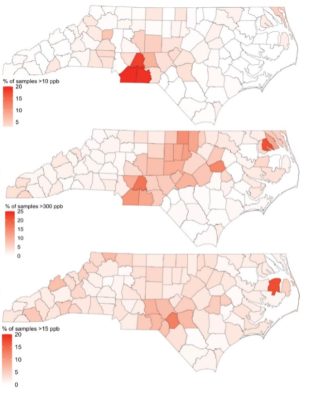New database shines light on environmental justice
To better understand this vulnerability, collaborative efforts within the UNC Superfund Research Program by Lauren Eaves, PhD, UNC SRP trainee, Julia Rager, PhD, Data Management and Analysis Core (DMAC) co-leader, Andrew George, PhD, Community Engagement Coordinator, and Rebecca Fry, PhD, UNC SRP Director, resulted in a recent publication and creation of the new publicly available database, NCWELL.
“The NCWELL database can help researchers and communities understand the extent to which levels of toxic metals exceed federal standards in private wells tested in North Carolina,” said Fry. “It demonstrates correlations between specific metals and health impacts especially in communities experiencing environmental injustices and can be used to prioritize geographic areas impacted by contaminants for interventions.”
NCWELL was created using data downloaded from publicly available well water test reports from the NC DHHS State Laboratory of Public Health, leading to a total of 117,960 well tests collected over twenty years throughout the state. These tests were then used to (1) identify geographic areas of high contamination (Figure 1), and (2) define priority areas for intervention based on multi-metal exposure (Figure 2).
Recognized by the National Institute of Environmental Health Sciences (NIEHS) as an Extramural Paper of the Month, this publication represents a continuation of over a decade of UNC SRP research to characterize well water contamination by toxic metals in North Carolina, beginning with a 2012 study by former UNC SRP Fry lab trainee Alison Sanders, PhD in 2012.
Furthermore, NCWELL builds on other UNC SRP initiatives to make data more available to researchers and communities addressing these environmental and access issues. This includes:
- NC ENVIROSCAN, a novel mapping tool developed by UNC SRP researchers to allow users to visualize trends of environmental contaminants. The extensive metals data from NCWELL will eventually be integrated into ENVIROSCAN, which currently maps contaminant levels for four toxic metals in private well drinking water.
- The UNC SRP Dataverse, a platform for publishing SRP data across projects and cores, created by the Data Management and Analysis Core (DMAC).
Data from NCWELL is currently being used to generate and update maps of contaminants across the state of NC that will be available on the UNC SRP website by the end of August 2022. The NC Department of Health and Human Services also plans to link to these maps from their website, providing further reach into communities that have questions about the quality of their drinking water.
According to George, “this work, in combination with the NC ENVIROSCAN, could lead to the potential for more real-time data analysis, allowing researchers to predict new trends in a timely manner and help our community partners such as NC DHHS better inform the public to take health-protective actions.”
However, this is only the beginning for how NCWELL may be utilized, as Eaves explains, “we are just starting to think about all of the possibilities for how the database can be used for public health research.”


